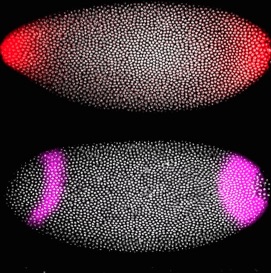 A common roundworm widely studied for its developmental biology and neuroscience, also might be one of the most surprising examples of the eat-local movement. Princeton University researchers have found that the organisms have a sure-fire method of ensuring a steady supply of a bacteria they eat — they grow their own.
A common roundworm widely studied for its developmental biology and neuroscience, also might be one of the most surprising examples of the eat-local movement. Princeton University researchers have found that the organisms have a sure-fire method of ensuring a steady supply of a bacteria they eat — they grow their own.
Monthly Archives: February 2017
Medical innovations, smart sensors and more impress judges at Innovation Forum
SIFP helps first-gen, low-income students thrive at Princeton
Terahertz chips a new way of seeing through matter
Monitoring program puts crucial info in hands of remotest farmers
Terahertz chips a new way of seeing through matter
 Electromagnetic pulses lasting one millionth of a millionth of a second may hold the key to advances in medical imaging, communications and drug development. But the pulses, called terahertz waves, have long required elaborate and expensive equipment to use. Now, researchers at Princeton University have drastically shrunk much of that equipment.
Electromagnetic pulses lasting one millionth of a millionth of a second may hold the key to advances in medical imaging, communications and drug development. But the pulses, called terahertz waves, have long required elaborate and expensive equipment to use. Now, researchers at Princeton University have drastically shrunk much of that equipment.
Temperature guides where species live and where they’ll go
Princeton joins court challenge to federal immigration executive order
Princeton University and 16 other universities filed a friend-of-the-court brief Monday supporting a legal challenge to the Trump administration’s Jan. 27 executive order on immigration.
President Eisgruber provides update on ‘state of the University’
New Rutgers-Princeton center uses computational models to understand psychiatric conditions
A new center is bringing together researchers from Princeton and Rutgers universities to apply computational modeling to the understanding of psychiatric diseases. The Rutgers-Princeton Center for Computational Cognitive Neuropsychiatry, which will open its doors this month, aims to improve the diagnosis of mental disorders, better predict their progression and eventually aid in developing treatments.
Research on ’70s urban housing crisis exposes a familiar history
Studies point way to precision therapies of genetic disorders
Eisgruber asks President Trump to ‘rectify or rescind’ immigration order
 Princeton President Christopher L. Eisgruber and 47 other American college and university presidents today sent a letter to President Trump urging him to “rectify or rescind the recent executive order closing our country’s borders to immigrants and others from seven majority-Muslim countries and to refugees from throughout the world.
Princeton President Christopher L. Eisgruber and 47 other American college and university presidents today sent a letter to President Trump urging him to “rectify or rescind the recent executive order closing our country’s borders to immigrants and others from seven majority-Muslim countries and to refugees from throughout the world.
Invisible coating preserves iconic stone structures threatened by decay
 The stone monuments of Italy’s Certosa di Bologna cemetery have stood for more than two centuries as symbols of peace and eternity. But even stone does not last forever. So Enrico Sassoni, a visiting postdoctoral research associate in Princeton’s Department of Civil and Environmental Engineering, is working to protect the marble monuments and even make them stronger.
The stone monuments of Italy’s Certosa di Bologna cemetery have stood for more than two centuries as symbols of peace and eternity. But even stone does not last forever. So Enrico Sassoni, a visiting postdoctoral research associate in Princeton’s Department of Civil and Environmental Engineering, is working to protect the marble monuments and even make them stronger.
President Eisgruber issues statement on federal immigration executive order
Students explore globalization at São Paulo Bienal
University community engages in Month of Service
Stereotypes about ‘brilliance’ may set in for girls as early as age 6
 By the age of 6, girls become less likely than boys to associate brilliance with their own gender. This could have an immediate impact on their interest level in activities and may have long-term effects, such as whether women feel confident pursuing careers in certain academic fields that “cherish brilliance,” according to a new study conducted by researchers at Princeton University, New York University and the University of Illinois at Urbana-Champaign.
By the age of 6, girls become less likely than boys to associate brilliance with their own gender. This could have an immediate impact on their interest level in activities and may have long-term effects, such as whether women feel confident pursuing careers in certain academic fields that “cherish brilliance,” according to a new study conducted by researchers at Princeton University, New York University and the University of Illinois at Urbana-Champaign.











